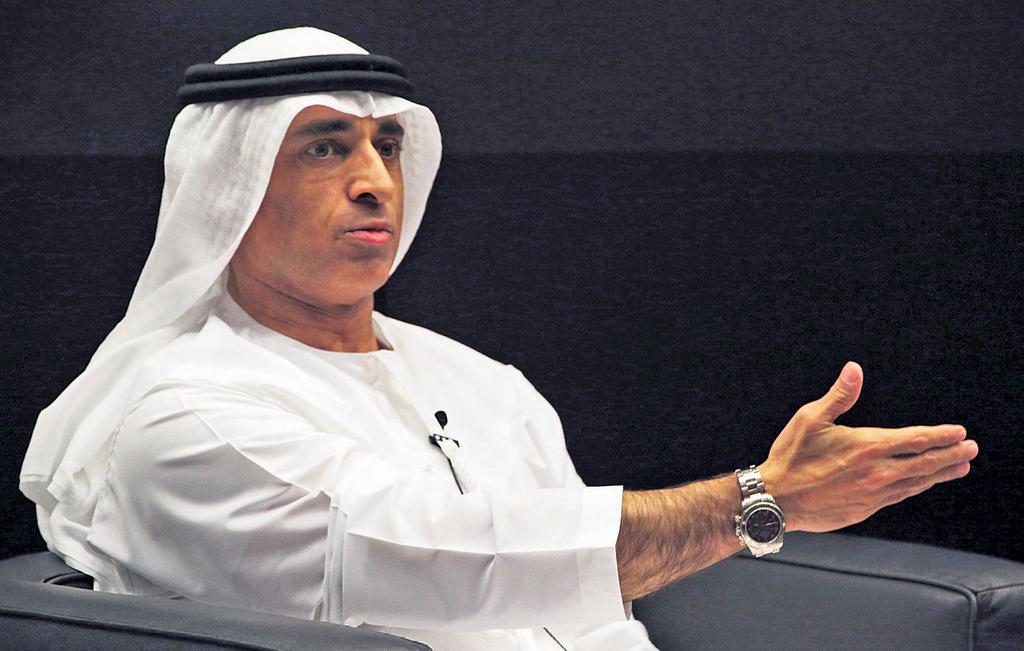Yousef al-Otaiba, the United Arab Emirates’ ambassador to Washington, resembles his country.
Young, energetic, handsome, wealthy, intelligent and focussed, Otaiba would fit in quite easily with Israel’s hi-tech entrepreneurs.
Dressed nattily, with a wry smile, he is the quintessential Arab diplomat of the new age — exuding pragmatism and practicality.
He has no interest in the toxic, febrile quagmires of the past. Nor patience for the destructive emotions of victimhood and guilt. His face is turned toward the future, striving to turn difficulties into opportunities. To make lemons into lemonade.
That’s exactly what he did in the summer of 2020 — when he conceived, formulated and initiated the peace agreement between Israel and the United Arab Emirates. It was not senior Israeli officials who stood behind the initiative. Nor was it the former Palestinian strongman, Mohammed Dahlan, now a resident of the UAE.
At its root, it was a pact between three leaders (United States President Donald Trump, Israeli Prime Minister Benjamin Netanyahu, and UAE Crown Prince Mohammed bin-Zayed), carried out by the three factotums who do their bidding in Washington: Trump’s son-in-law, Jared Kushner (39), Israel’s ambassador, Ron Dermer (49) and Yousef al-Otaiba (46).
But the son the UAE’s first energy minister played the leading — and most creative — role. He thought outside the box. He understood the interests and constraints of all three sides. He recognized that within a profound crisis lay a great opportunity. A historic one.
Because his mother is Egyptian, Otaiba grew up and was educated in Cairo. Even as a seven-year-old, he admired Egyptian President Anwar Sadat. Later, he learned from Sadat the importance of modernity, the efficacy of the alliance with the West, and the value of peace.
So when he found himself at a historic crossroads a few months ago — he understood he had to act in the spirit of Sadat and convince his country to take Sadat-like action.
The now famous op-ed piece he published in Ynet's sister publication Yedioth Ahronoth on June 12, was the first move.
It was meant to halt Netanyahu’s unilateral annexation (of some 30 per cent of the West Bank) by directly addressing Israel’s citizenry. At this point, no one was talking peace, or even thinking peace.
The goal was to prevent an Israeli diplomatic debacle which threatened the longterm strategy devised by MBZ, the Emirati crown prince: cooperation with Israel as part of a new Middle East, where moderate forces work together to curb radical ones in order to promote an accelerated process of modernization.
The weeks following publication were frustrating. Netanyahu refused to forgo annexation. He believed he could do both: annex territory and preserve Israel’s quiet alliance with the UAE.
Thus, Otaiba had to apply significant pressure on his friend Kushner. He warned him that unilateral annexation would have severe and far-reaching consequences: it would play into the hands of Iran, Turkey, and Qatar and allow them to incite the Arab street against moderate Arab leaders.
President Trump’s Deal of the Century would collapse. There would be no progress toward normalization. Even the existing economic association between Israel and the UAE would be endangered.
Kushner understood, but seemed, at first, to have little room to maneuver. He began exploring formulas for partial and minimal annexation. All sides understood that they had arrived at an impasse.
But then the inventive statesmen of the UAE had a sudden realization: rather than attempting to minimize annexation, it would be better to scupper it by means of a grand gesture. In other words, Israel would agree to set aside a unilateral move as part of a diplomatic treaty. Annexation would be scrapped in exchange for a non-belligerency pact.
When he received the go-ahead from MBZ, Otaiba called Kushner. Who called Dermer. Who called Netanyahu.
Israel’s prime minister turned down the offer. He demanded full peace. Dermer informed Kushner. Who informed Otaiba. Who informed the leadership in Abu-Dhabi.
MBZ weighed his options for a few days, and came back with his own demand: full normalization would require Israel to abandon for good its annexation plan.
Separately, and in parallel, he sought to upgrade the UAE’s bilateral security arrangements with the United States. Otaiba relayed the message to Kushner, who acted quickly.
A few days later, he returned with a fully positive response on the bilateral issue, and a partially positive response on annexation. Israel would agree to postpone annexation for a period of time, and any future annexation would take place only with the consent of the United States.
So the peace between the UAE and Israel was both expected and surprising. For Israelis it embodies a worldview according to which it is possible to make a peace-for-peace and and power-based-peace agreements with Arab nations without fearing a Palestinian veto, or sinking into the Palestinian mud.
For Arabs, it crystallizes the worldview of Mohammed bin-Zayed, which promotes modernity, balks at fanaticism and seeks pragmatic partners with whom to build a common future.
For Israelis and Arabs, alike, it symbolizes the alliance of moderates (who are struggling against Iran and jihad), moderns (who believe in innovation, technology and fast economic growth) and orphans (who fear that the United States is retreating from the Middle East and leaving them on their own).
Hence, normalization represents the acme of a multi-decade process of ever-closer security, intelligence and economic coordination — and makes public a brave friendship.
But at the same time, the peace between Israel and the UAE is also surprising. No one foresaw it, no one planned for it. It was an ad hoc improvisation that succeeded — big time.
So the genius it engenders is not the genius of forethought, but the genius of exploiting opportunities to best advantage. Overnight. In the moment.
And the great improvisors who brought it into the world are undoubtedly Mohammed bin-Zayed and Yousef al-Otaiba. An Emir and his ambassador who are the new faces of a new and modern Arabism.


